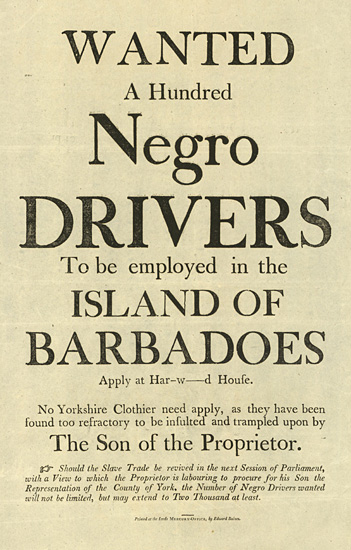In 1627, English colonizers began to settle in Barbados, an eastern Caribbean island, to expand their territory. Their primary reason for coming to Barbados was for planting sugar, so that England might avoid having to buy sugar from other European nations that produced sugar on their own Caribbean islands. The English saw how strong the demand for sugar was. Since sugar cane grew naturally on Barbados, the English saw Barbados as a lucrative opportunity.

However, the Englishmen who wanted to engage in this business had to decide who to send to Barbados to grow, harvest, and process the sugar cane into refined sugar. This was not an easy task, but these Englishmen did have a number of Irish prisoners serving various sentences. They decided on a way for these Irish prisoners to work off their sentences on Barbados sugar plantations. They sent thousands of indentured Irish prisoners to Barbados.1
As the years of growing and exporting this material continued, the English began to think of better ways for the crop to be harvested and exported faster. They needed a higher efficiency route, as well as a way that was cheaper, because the Irish indentured servants did receive some form of salary, even though they were indentured. By the 1670s, African slaves, a cheaper source of labor being used throughout the Caribbean islands, became the alternative to Irish indentured servants. As the English continued to expand their plantations, they began importing African slaves in increasing numbers.2
Between 1627 and 1807, more than 400,000 Africans, mainly originating from West Africa, had been brought to Barbados as slaves to work on sugar plantations. The English planters would request and receive more slaves whenever they believed they needed more for the plantations. The Africans were viewed as nothing more than interchangeable machine parts in the process of sugar production. The treatment experienced by the Africans was among the most inhumane in human history.3
Starting in 1640, Africans were thought of as inferior to Englishmen. Africans were not thought to have the capacity to be intelligent. In consideration of how dark skin color was defined as life of lesser value than light skin color, legal codes naturally evolved out of these attitudes.4

Although the English were continually resupplied with Africans, they felt the need to have restrictions or rules set in motion when it came to controlling the labor of African slaves. The Barbados Slave Code of 1661 created a way for planters to be able to have full capacity to control their slaves by any means they felt necessary without any legal repercussions. The Barbados Slave Code was originally enacted to serve both parties, trying to benefit the slaves and the planters; but it did not go according to plan. Slave owners were to protect their slaves from cruelty:
[N]egroes [are] an heathenish brutish and an unsertaine dangerous kinde of people…yett wee well know by the right rule of reason and order wee are not to leave them to the Arbitrary cruele and outragious wills of every evill disposed person but soo farr to protect them as wee doo many other goods and Chattles and alsoe somewhat farther as being created Men though without the Knowledge of God in the world.5
The slaves did receive one positive from the Barbados Slave Code: the ability to have a change a clothing once a year. The planters, on the other hand, were provided with many new ways to keep their slaves in line. They had the right and the authority to chastise, whip, brand, lacerate, cripple, set them on fire, or murder them with no negative consequences. The reason is during this time the English common Law, which included the right to a jury and judge, was not offered to the Africans, showing that they did not have the same rights as the planters. Africans were unable to be assured any of these statutes if their English masters harmed them in anyway.6
The Barbados Slave Codes began to spread from Barbados to Jamaica, Antigua, and also to South Carolina, where these Codes became the legal basis for slavery and the treatment of slaves in many of the thirteen colonies.7
- Hilary McD. Beckles, “A ‘riotous and Unruly Lot’: Irish Indentured Servants and Freemen in the English West Indies, 1644-1713,” The William and Mary Quarterly 47, no. 4 (1990): 503–7. ↵
- Hilary McD. Beckles, “A ‘riotous and unruly lot’: Irish Indentured Servants and Freemen in the English West Indies, 1644-1713,” The William and Mary Quarterly 47, no. 4 (1990): 505. ↵
- Kenneth Morgan, “Review of Caribbean Exchanges: Slavery and the Transformation of English Society, 1640-1700, by Susan Dwyer Amussen,” The Journal of Modern History 81, no. 3 (2009): 667. ↵
- Kenneth Morgan, “Review of Caribbean Exchanges: Slavery and the Transformation of English Society, 1640-1700, by Susan Dwyer Amussen,” The Journal of Modern History 81, no. 3 (2009): 667. ↵
- Barbados Slave Code of 1661, as quoted in Bradley J. Nicholson, “Legal Borrowing and the Origins of Slave Law in the British Colonies,” The American Journal of Legal History 38, no. 1 (1994): 38–54. Nicholson makes the point that the 1661 Code was only slightly modified in 1676, 1682, and 1688. ↵
- Bradley J. Nicholson, “Legal Borrowing and the Origins of Slave Law in the British Colonies,” The American Journal of Legal History 38, no. 1 (1994): 51. ↵
- M. Eugene Sirmans, “The Legal Status of the Slave in South Carolina, 1670-1740,” The Journal of Southern History 28, no. 4 (1962): 462–73. ↵



51 comments
Aaron Onofre
First of all this was a great article, it was very informative. The Barbados Slave Codes really opens your eyes to the extreme prejudice that owners had toward their slaves. The way they viewed the slaves as just property and nothing else, really causes you to think about how lowly they truly perceived the enslaved Africans. It also quite horrifying that these same extremely unethical codes were adopted by so many neighboring island and colonies.
Stacy
All in the name of Christianity… It amazes me how religion affected us then and now.
Aaron Onofre
First of all this was a great article, it was very informative. The Barbados Slave Codes really opens your eyes to the extreme prejudice that owners had toward their slaves. The way they viewed the slaves as just property and nothing else, really causes you to think about how lowly they truly perceived the enslaved Africans. It also quire horrifying that these same extremely unethical codes were adopted by so many neighboring island and colonies.
Valeria Varela
I found this article interesting and was written very well. This is the first time I’m hearing of The Barbados Slave Codes, however, it’s very heartbreaking to hear through history how horribly slaves were treated.
Stacy
All in the name of Christianity… It amazes me how religion affected us then and now.
Gregory Williams
Unreal!
Aaron Sandoval
I found this article very interesting and insightful, I knew very little about the topic and found myself learning more due to this article and how the author went about explaining it. I found the slave codes very interesting, and the fact despite there being an attempt to serve both parties I think it would be obvious that there would truly be very little benefiting the slaves due to the fact that they were slaves and had no freedom, and the Englishmen could treat them however they liked with no legal consequences.
Alexis Lopez
I enjoyed reading this article because I was able to learn about something new such as the Barbados Slave Codes. It was interesting to learn how strict the Englishmen were and who they were going to choose to go to Barbados to plant and grow the sugar. Maalik Stansbury did a great job explaining the topic and giving enough information so that the readers like me can understand.
Lesley Martinez
It’s interesting, yet unfortunate to read about the horrific treatment that African slaves received. The idea that the color of a person’s skin is what determined one’s inferior status is ridiculous. The Barbados Slave Codes are quite interesting as they note that a master had to protect his/her slaves yet was able to treat them cruelly. This is a great article that raises a topic that is important to the history of the world, including American because as you mentioned, it spread to become the legal basis for slavery in many of the thirteen colonies.
Colin
They are or were not African Slaves, there is no such people on the planet….they are or were African people, kidnapped, and placed into involuntary servitude…….you have it sound as if the African Kings, Queens, Scholars etc, are SLAVES, and procreate to produce more SLAVES….STOP IT.
Hali Garcia
This is a very interesting article. It is so weird to think that it was once allowed to own another human being at a time. What strikes me the most is how African slaves were not even seen or considered human beings as well as being viewed as parts and not valued as anything else. It was also disturbing how their owners could punish them and end up killing one of their slaves and there would be no consequences.
Makenzie Santana
I wish there was more fair treatment that came with the slave codes in Barbados, what originally were supposed to be the Irish prisoners to harvest sugar cane, was pushed onto the laps of African slaves. I would hardly call it a positive note that the slaves were allowed in a change of clothing every year like it was a great privilege when in all honesty is was a necessity that was limited to them by the plant owners.
Maya Mani
In school students learn a lot about slavery, and it was always really difficult to hear about their terrible treatment. The fact that laws like this ever existed is so sickening and I will never understand so many people had a lack of human decency and empathy during this time. Nothing about slavery is logical or justifiable, and while it’s a difficult thing to come to terms with, it’s important to raise awareness about exactly what happened.